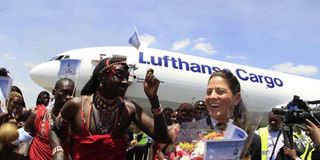German-Kenya trade ties growing firmer

The crew of a Lufthansa cargo plane is welcomed at the Jomo Kenyatta International Airport on March 11, 2014. FILE PHOTO | DIANA NGILA |
What you need to know:
- Germany recognises Kenya as a strategic and dependable partner in Africa.
- Indeed, it cannot be gainsaid that Kenya is the regional anchor state, a vortex of economic activities.
Germany was the first country to officially recognise Kenya upon its independence from Britain in 1963.
This explains why Germany’s Mission to Kenya is designated number one diplomatic number plate, a symbol of the provenance of the diplomatic relations.
The framework of engagement and cooperation between Kenya and Germany is anchored on broad areas of political, economic and cultural spheres. This, for example, is manifested by the vibrant high level executive and legislative exchanges, mutual business delegations and educational programmes.
Germany recognises Kenya as a strategic and dependable partner in Africa. Indeed, it cannot be gainsaid that Kenya is the regional anchor state, a vortex of economic activities.
It is noteworthy to point out that even after the cataclysmic effects of World War II, Germany has risen like a phoenix from the ashes, earning itself stripes as the largest economy in the world after the US, China and Japan.
Kenya stands to benefit from Germany’s experiences and its roadmap to becoming Europe’s economic “comeback kid”.
Trade between Kenya and Germany has been on the upward trajectory in the last few years. Germans are fervent consumers of Kenya’s coffee, tea, cut flower and crude vegetables. On the other hand, the Kenyan market consumes Germany’s brand of automobiles, machinery, electronics, medicaments and assorted chemicals.
The balance of trade, however remains asymmetric in favour of Germany. To mitigate against the imbalance, Kenya is engaged in bilateral efforts and enabling multilateral trade instruments, including the very strategic measures of adding value to its primary exports to Germany.
German investors are assured of a congenial investment environment in Kenya.
SKILLED LABOUR FORCE
Driven by market forces, a stable political milieu, skilled labour force, an expanding middle class, and an attractive tax regime, Kenya offers the most competitive and assuring investment opportunity for all.
The Kenya Government encourages Germans to seize the tremendous investment opportunities in the areas of energy, mining, infrastructure, water harvesting and banking under its Vision 2030.
It is worth noting that Kenya is now home to more than 100 German investors, including brands such as Bayer, Henkel, BASF and BOSCH.
On the other hand, over 20 companies owned by Kenyans are incorporated in Germany in the areas of coffee and tea exports, hospitality, real estate and handicraft.
Increasingly, Germany is becoming a loyal tourism market-source in Europe, with an average of 65,000 visitors annually. The recent announcement by Lufthansa Airline to resume direct flights from Frankfurt to JKIA in October, after a hiatus of 18 years, is even more set to boost tourist numbers.
This was a result of trenchant negotiations and assurances by my delegation that the Kenyan destination was propitious to their strategic business forecasts.
The Kenya Government appreciates the friendly and practical approach taken by German authorities in responding to isolated terror attacks. As a show of solidarity, Germany opted not to slap blanket travel advisories on Kenya.
Through the German Academic Exchange Service, more than 2,500 Kenyans have benefited from graduate training programmes.
I commend the kind gesture by DAAD for awarding in-country scholarships to 300 students of Garissa University who survived the terror attack in April.
Mr Magutt is Kenya’s Ambassador Extraordinary and Plenipotentiary to the Federal Republic of Germany and accredited to Bulgaria and Romania.




